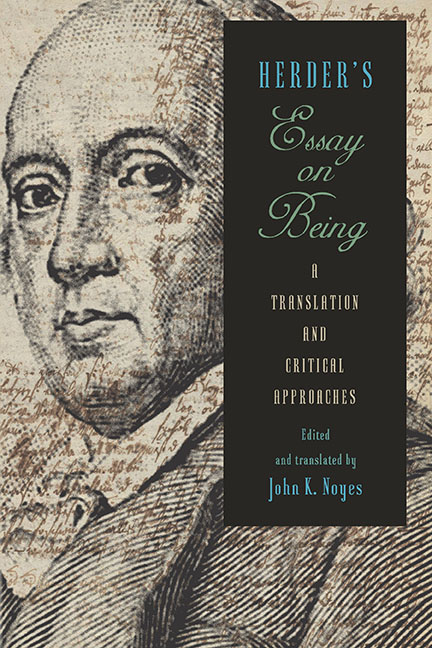Book contents
- Frontmatter
- Contents
- Acknowledgments
- List of Abbreviations
- Introduction: The Essay on Being
- Part I Versuch über das Seyn, by Johann Gottfried Herder
- Part II Critical Essays
- Herder's Essay on Being
- The Order of Being and the Order of Ideas: The Historical Context of Herder's Essay on Being
- Indivisible, Inexplicable, and the Center of All Certainty: Herder's Concept of Being
- The Metaphysical Foundation of Subjective Philosophy in Herder's Essay on Being
- Herder's Kantian Critique of Kant on the Concept of Being
- Attempting to Place the Essay on Being
- Herder's Early Neoplatonism
- Being, Possibility and God: A Comparison of Herder and Heidegger
- Bibliography
- Notes on the Contributors
- Index
Indivisible, Inexplicable, and the Center of All Certainty: Herder's Concept of Being
from Part II - Critical Essays
Published online by Cambridge University Press: 13 April 2019
- Frontmatter
- Contents
- Acknowledgments
- List of Abbreviations
- Introduction: The Essay on Being
- Part I Versuch über das Seyn, by Johann Gottfried Herder
- Part II Critical Essays
- Herder's Essay on Being
- The Order of Being and the Order of Ideas: The Historical Context of Herder's Essay on Being
- Indivisible, Inexplicable, and the Center of All Certainty: Herder's Concept of Being
- The Metaphysical Foundation of Subjective Philosophy in Herder's Essay on Being
- Herder's Kantian Critique of Kant on the Concept of Being
- Attempting to Place the Essay on Being
- Herder's Early Neoplatonism
- Being, Possibility and God: A Comparison of Herder and Heidegger
- Bibliography
- Notes on the Contributors
- Index
Summary
A Unifying Idea for Herder
THE CASE IS INCREASINGLY BEING MADE for the importance of Herder as a ph ilosopher of first rank. However, the range of his production presents any reader approaching his work with the difficulty of arriving at a general characterization of his thought. His authorship is immense and spans a multiplicity of fields, with the result that we are often presented with many versions of Herder depending on which aspect of his work is being focused upon: philosophy, anthropology, theology, linguistics, historicism, and so forth. The interpretative task is to locate a unifying idea that will help us to hold Herder's diverse writings together, and come to an understanding of his overall aim as a thinker. This represents a substantive endeavour, to which this examination aspires to make a contribution by suggesting the central role of Being, which he refers to as “unanalyzable – unproveable – the centre of all certainty” (FHA 1:20; EB, 71). It will explore Herder's very first surviving philosophical work, the Essay on Being, in which he offers a response to Kant's pre-critical consideration of the ontological argument as set out in Der einzig mögliche Beweisgrund.
In this text Kant proffered a revised version of the ontological argument. Kant's consideration puts forth an early version of his rejection of Being as a predicate; one which we later see revised and expanded in the context of his critical philosophy in the Critique of Pure Reason (see AA 3:A592–602, B620–630). However, what concerns us here is less Kant's critique of the philosophical locus classicus than his argument for the necessity of Being and the equation of this Being with God. Because Being contains the basis for all possibilities, all things are only possible through its function as their ground. Since the possibility of the existence of all a posteriori reality rests upon Being, Kant maintains that he can offer an a priori argument for the necessary existence of Being, and therefore of God. Herder's Essay accepted the spirit of Kant's exploration of Being, and its claim that Being constitutes the ground of predication, but it rejected the a priorism of Kant's elaboration.
- Type
- Chapter
- Information
- Herder's Essay on BeingA Translation and Critical Approaches, pp. 108 - 118Publisher: Boydell & BrewerPrint publication year: 2018

